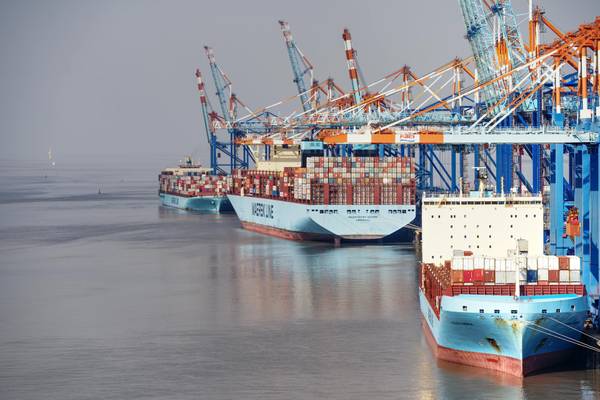
Top 5 Trends Shaping India's Logistics Industry in 2024
India's logistics industry, a crucial component of the nation's economic framework, is undergoing significant transformations as it adapts to evolving technological advancements, regulatory changes, and market demands. In 2024, several key trends are influencing the sector, driving innovations, efficiency improvements, and sustainability initiatives. This article explores the top five trends shaping Logistics solution company in india in 2024.
1. Digital Transformation and Automation
The logistics industry in India is experiencing an accelerated digital transformation, driven by advancements in technology and the need for greater efficiency. Automation, including the use of robotics and artificial intelligence (AI), is revolutionizing warehousing and supply chain operations. Companies are increasingly adopting automated systems for inventory management, order processing, and logistics planning.
The integration of AI and machine learning algorithms is enhancing predictive analytics, enabling logistics providers to forecast demand, optimize routes, and manage inventory more effectively. This digital shift not only reduces operational costs but also improves accuracy and speed, ensuring a more agile supply chain.
Moreover, the adoption of Internet of Things (IoT) technology is playing a pivotal role in real-time tracking and monitoring of goods. IoT-enabled sensors provide valuable data on shipment conditions, location, and transit times, allowing for better decision-making and improved customer service.
2. Sustainability and Green Logistics
As environmental concerns gain prominence, sustainability has become a central focus in the logistics industry. Companies are increasingly prioritizing green logistics practices to minimize their carbon footprint and comply with regulatory requirements.
In 2024, the emphasis on sustainability is evident in the adoption of eco-friendly technologies and practices. Electric and hybrid vehicles are gaining traction as alternatives to traditional diesel-powered trucks, reducing emissions and fuel consumption. Logistics companies are also investing in energy-efficient warehouses and implementing waste reduction strategies.
The Indian government has introduced various incentives and policies to promote green logistics, such as subsidies for electric vehicles and support for renewable energy projects. These initiatives are encouraging businesses to integrate sustainability into their operations, aligning with global trends and consumer expectations for environmentally responsible practices.
3. E-commerce Boom and Last-Mile Delivery Innovations
The rapid growth of e-commerce in India is transforming the logistics landscape, particularly in the realm of last-mile delivery. With the rise of online shopping, there is an increasing demand for efficient and timely delivery solutions.
To address the challenges of last-mile delivery, logistics providers are exploring innovative solutions. Companies are leveraging technology to optimize delivery routes, enhance package tracking, and improve delivery speed. The use of micro-warehouses and localized distribution centers is becoming more common to reduce delivery times and costs.
Additionally, the integration of autonomous delivery vehicles, such as drones and robots, is gaining traction. While still in the early stages, these technologies have the potential to revolutionize last-mile delivery by offering faster and more cost-effective solutions.
4. Government Initiatives and Policy Reforms
The Indian government has been actively involved in shaping the logistics industry through various policy reforms and initiatives aimed at improving infrastructure, reducing bottlenecks, and enhancing efficiency.
One of the significant reforms is the implementation of the National Logistics Policy (NLP), which seeks to create a streamlined and integrated logistics ecosystem. The NLP focuses on improving infrastructure, reducing logistics costs, and enhancing overall supply chain performance. It also emphasizes the development of multimodal transport hubs and the integration of technology in logistics operations.
Additionally, the introduction of the GST (Goods and Services Tax) has simplified the tax structure for logistics companies, reducing complexity and promoting smoother interstate trade. The government's focus on infrastructure development, including the construction of dedicated freight corridors and modernization of ports, is further contributing to the growth and efficiency of the logistics sector.
5. Rise of Startups and Innovation Ecosystem
India's logistics industry is witnessing a surge in innovative startups that are disrupting traditional business models and introducing new solutions to address industry challenges. These startups are leveraging technology and data analytics to create novel approaches to logistics and supply chain management.
From digital freight marketplaces to advanced warehousing solutions, these startups are driving innovation and competition in the industry. Many of them are focusing on niche areas such as cold chain logistics, reverse logistics, and supply chain visibility.
The rise of the startup ecosystem is also fostering collaboration between traditional logistics players and technology-driven companies. This collaboration is leading to the development of integrated solutions that combine the expertise of established players with the agility and innovation of startups.
Conclusion
The Logistics solution company in india is undergoing a period of significant change, driven by digital transformation, sustainability initiatives, e-commerce growth, government reforms, and the rise of innovative startups. As these trends continue to evolve, they are shaping the future of logistics in the country, creating opportunities for growth and development.
For businesses operating in this dynamic environment, staying informed about these trends and adapting to the changes will be crucial for maintaining a competitive edge and achieving long-term success. The logistics industry's evolution presents both challenges and opportunities, and those who embrace innovation and sustainability will be well-positioned to thrive in the years to come.